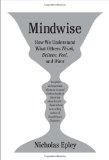new book – ‘What *Should* We Be Worried About? ed. by John Brockman (Edge.org Annual Question)
February 12, 2014
What Should We Be Worried About?: Real Scenarios That Keep Scientists Up at Night, ed. by John Brockman (Harper, 2014)
Book description from the publisher:
Drawing from the horizons of science, today’s leading thinkers reveal the hidden threats nobody is talking about—and expose the false fears everyone else is distracted by.
What should we be worried about? That is the question John Brockman, publisher of Edge.org (“The world’s smartest website”—The Guardian), posed to the planet’s most influential minds. He asked them to disclose something that, for scientific reasons, worries them—particularly scenarios that aren’t on the popular radar yet. Encompassing neuroscience, economics, philosophy, physics, psychology, biology, and more—here are 150 ideas that will revolutionize your understanding of the world.
Steven Pinker uncovers the real risk factors for war * Mihaly Csikszentmihalyi peers into the coming virtual abyss * Nobel laureate Frank Wilczek laments our squandered opportunities to prevent global catastrophe * Seth Lloyd calculates the threat of a financial black hole * Alison Gopnik on the loss of childhood * Nassim Nicholas Taleb explains why firefighters understand risk far better than economic “experts” * Matt Ridley on the alarming re-emergence of superstition * Daniel C. Dennett and george dyson ponder the impact of a major breakdown of the Internet * Jennifer Jacquet fears human-induced damage to the planet due to “the Anthropocebo Effect” * Douglas Rushkoff fears humanity is losing its soul * Nicholas Carr on the “patience deficit” * Tim O’Reilly foresees a coming new Dark Age * Scott Atran on the homogenization of human experience * Sherry Turkle explores what’s lost when kids are constantly connected * Kevin Kelly outlines the looming “underpopulation bomb” * Helen Fisher on the fate of men * Lawrence Krauss dreads what we don’t know about the universe * Susan Blackmore on the loss of manual skills * Kate Jeffery on the death of death * plus J. Craig Venter, Daniel Goleman, Virginia Heffernan, Sam Harris, Brian Eno, Martin Rees, and more
Google Books preview:
See also: Annual Question at Edge.org





